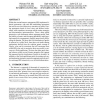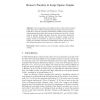139 search results - page 8 / 28 » On the Evolution of Selfish Routing |
CONEXT
2007
ACM
14 years 16 days ago
2007
ACM
Within the current Internet, autonomous ISPs implement bilateral agreements, with each ISP establishing agreements that suit its own local objective to maximize its profit. Peerin...
SIGMETRICS
2008
ACM
13 years 8 months ago
2008
ACM
Overlay routing operating in a selfish manner is known to cause undesired instability when it interacts with native layer routing. We observe similar selfish behavior with the Bit...
WINE
2010
Springer
13 years 6 months ago
2010
Springer
Braess's paradox, in its original context, is the counter-intuitive observation that, without lessening demand, closing roads can improve traffic flow. With the explosion of d...
INFOCOM
2011
IEEE
13 years 1 days ago
2011
IEEE
—The rapid scaling up of Networked Control Systems (NCS) is forcing traditional single-hop shared medium industrial fieldbuses (a.k.a. fieldbuses) to evolve toward multi-hop sw...
INFOCOM
2006
IEEE
14 years 2 months ago
2006
IEEE
—We consider routing games where the performance of each user is dictated by the worst (bottleneck) element it employs. We are given a network, finitely many (selfish) users, eac...


